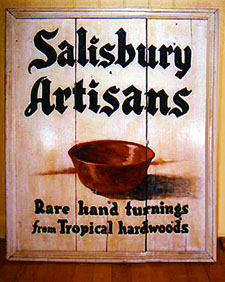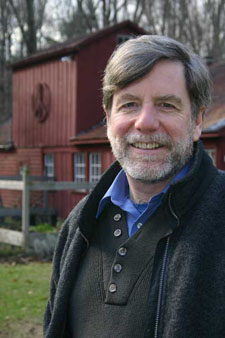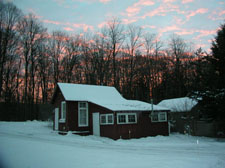Originally the Salisbury Cutlery Handle Company (circa 1860), Salisbury Artisans is now David Bowen’s custom furniture shop. We are in the beautiful historic area along the Wachicastinook Brook at the base of Mount Riga in Salisbury, CT. Carbon Neutral: Fifty-two PV panels make our electricity and power our home’s geothermal system. A Steibol-Eltron evacuated tube solar collector heats our shop floor. Click photo to enlarge.
 At the top of the mountain, The Mt Riga Iron Furnace began iron production in 1810 at the outlet of south pond. Ship anchors, for among others, “Old Ironsides,” and the chain link that stopped the British on the nearby Hudson River were made in Salisbury. George Washington called the town ” The Arsenal of the Revolution.” With water power and proximity to town, business thrived here on Factory Street among them: wool fulling mills(5,7), knife handles (5), a grainery, a lumber mill, a trip-hammer shop said to have made parts for guns(7), ‘the acme ruler’ factory(4) and a bicycle factory(4).
At the top of the mountain, The Mt Riga Iron Furnace began iron production in 1810 at the outlet of south pond. Ship anchors, for among others, “Old Ironsides,” and the chain link that stopped the British on the nearby Hudson River were made in Salisbury. George Washington called the town ” The Arsenal of the Revolution.” With water power and proximity to town, business thrived here on Factory Street among them: wool fulling mills(5,7), knife handles (5), a grainery, a lumber mill, a trip-hammer shop said to have made parts for guns(7), ‘the acme ruler’ factory(4) and a bicycle factory(4).
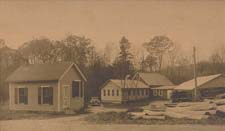 The Salisbury Cutlery Handle Factory began in the 1860’s and by the 1920’s was one of the largest employers in Salisbury.
The Salisbury Cutlery Handle Factory began in the 1860’s and by the 1920’s was one of the largest employers in Salisbury.
Stag and exotic wood knife handles were made for cutlery companies including the Clyde Cutlery Co., the Baldwin Cutlery Co., and Holley Manufacturing Company. Click the photo and click a second time to enlarge. Photos courtesy of The Salisbury Association.
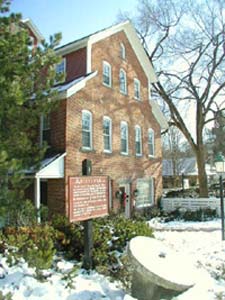
Having been established by Ethan Allen, Salisbury’s iron industry was greatly advanced by the Holley family, especially by bringing the Bessemer process to America. A film documenting this great American family is available from The Salisbury Association.
In 1844 Alexander Hamilton Holley began the Holley Manufacturing Company, the first Company in the U.S. to make pocket knives. The Salisbury Cutlery Handle Factory made wood, bone and antler handles for these popular knives for many years.
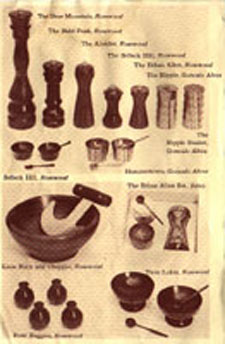 Recognizing the beauty of the hardwoods, Phil Warner’s knife handle factory bought a lathe and began producing “treen,” or small wooden ware. Turning stunning bowls, candle holders, and pepper mills from the Rosewood and Cocobolo they used for the cutlery handles, they were now called the “Salisbury Artisans.
Recognizing the beauty of the hardwoods, Phil Warner’s knife handle factory bought a lathe and began producing “treen,” or small wooden ware. Turning stunning bowls, candle holders, and pepper mills from the Rosewood and Cocobolo they used for the cutlery handles, they were now called the “Salisbury Artisans.
“Richard Parsons was the master turner. An olympic cross country skier, Mr Parsons represented the United States in the 1932 and 1936 Winter Games.
Many Salisbury residents have some of this lovely wooden ware to this day. Most of the pieces are named for natural sites of Salisbury, CT: Selleck Hill, Cobble, Bald Peak, Ethan Allen, Twin Lakes and more.
Click the catalog. Click again to enlarge.
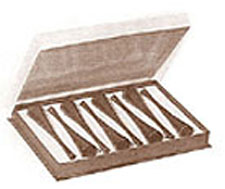
Salisbury Artisans produced treen with superb form and rich patina. The Museum of Modern Art, in a show of the best 100 Christmas gifts of 1948, recognized Salisbury Artisans for their delicately-turned “muddlers”(small sticks for stirring mixed drinks). See “table 11” on the MOMA master list (PDF file). Early advertising in the Tanglewood playbill help to make these turnings popular locally. Salisbury Artisans also created a gavel used to call the CT Legislature to order.
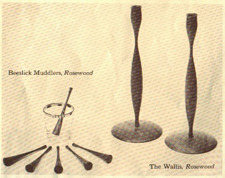 In 1951, Salisbury Artisans partnered with reknown designer and potter Eva Zeisel on several forms for the home. The results were turned tables, fruit stands and a tea service tray. This page from the SA catalog of the 1950’s shows her wonderful rosewood candlesticks.
In 1951, Salisbury Artisans partnered with reknown designer and potter Eva Zeisel on several forms for the home. The results were turned tables, fruit stands and a tea service tray. This page from the SA catalog of the 1950’s shows her wonderful rosewood candlesticks.
Click the photo for more SA collaborations with Eva Zeisel. Click again to enlarge.
Taking over Salisbury Artisans in the 1960’s, Lewis & Fannie McClure, along with turner Richard Parsons, continued making bowls and fine treen. ‘Mac’s’ wooden replica of the Gutenberg Printing Press can still be seen at the Scoville Library on Main Street.Click Mac’s sign for an article about his tenure here in PDF format
David Bowen purchased the complex in 1997. After an alliance with William Ward Beecher, painter and Bridget Duxbury, potter, the artisans plural are now singular: David continues on with his cabinet shop at Salisbury Artisans.
Proportion, appropriateness of style, & showing beauty of wood are equally important in his work.
photo: Walter Kidd
MEDIA:
New England Home Magazine: Historic 1776 Home (David’s pergola, kitchen cabinetry, vanities).


